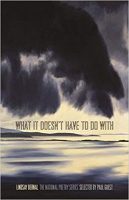September 4, 2018
Edited by David Sanders
Specimen Days
1321—Dante Alighieri, Italian poet and author (Dante's Inferno, Divina Commedia), dies at 56.
1910—Yi Sang, prominent Korean author and poet (Dying Words, Wings, Child’s Bone), born in Jongro, Seoul (d. 1947), is born.
1920—Mario Benedetti, Uruguayan journalist, novelist and poet, born in Paso de los Toros, Uruguay (d. 2009).
1934—Hans Faverey, Dutch poet, is born.
2012—Louis Simpson, Jamaican-American poet (Good News of Death), dies at 89.

Beating his lead with the blunt
end of his axe, flattening it
in order to forget that he is
a child of death who wants to weight
his net. Until it is suddenly
done and the one who did not disappear
stands in my room, taking me
in; still lying whether I am,
and how.
—from "Beating His Lead" by Hans Favery, trans. by Francis R. Jones
“Beating his lead with the blunt / end of his axe, flattening it / in order to forget that he is / a child of death” – Hans Favery
World Poetry
Neruda Nephew: Chile Debt Blocks Tests on Poet’s Remains

A nephew of Pablo Neruda said Thursday that money owed by Chile to laboratories abroad is blocking final tests to determine the cause of death of the Nobel Prize-winning poet. Rodolfo Reyes said the government owes about $16,000. The money includes tests carried out by laboratories in Canada and Denmark.
Pablo Neruda’s nephew said Chile owing money to laboratories abroad delayed tests determining the poet’s cause of death.
Recent Reviews
On Not Being Sylvia Plath
by Colm Tóibín
There were two anthologies of modern poetry in our house when I was a teenager and they both offered glimpses of the world outside that were more intense, more useful, than anything on television or on albums or in ordinary books. One was The Penguin Book of Contemporary Verse, edited by Kenneth Allott. It had been published first in 1950, with a second edition in 1962. The other was The New Poetry,also published in 1962. Edited by A. Alvarez, it had a crazy Jackson Pollock painting on the cover. In the Allott anthology I was intrigued by some of the poems that came towards the end, most notably Jon Silkin’s ‘Death of a Son’, whose last line (‘And out of his eyes two great tears rolled, like stones, and he died’) I thought sadder than anything in Joni Mitchell or Leonard Cohen. I was also interested in Thomas Kinsella’s ‘Another September’, because I knew the house just outside Enniscorthy where it was set and I had met the poet’s wife, whose sleeping figure was evoked in the poem. What was most interesting about it, though, was the way it left the familiar behind and moved into a set of images and cadences that I could not fully understand:
J.H. Prynne | The Oval Window | reviewed
by Ian Pople
This new edition of The Oval Window contains both Prynne’s original poem and also an annotated version of the same text. The book also contains drawing and photographs which Prynne made and took around the time of the composition of the poem. In particular, the book provides Prynne’s black and white photos of ruined huts on Tinkler Crags in Northumberland. As Neil Reeve comments in the essay which finishes this new edition, Tinkler Crags was to have been close to the site of a silo for Blue Streak missiles constructed in the 1950s, a silo which was abandoned, defeated by the geology of the area.
The Poet and the Historian
by Mary Jo Salter
I begin with a confession of bias. I am lucky enough to have been acquainted with both of the hilarious letter writers whose fruits are gathered in A Bountiful Harvest: The Correspondence of Anthony Hecht and William L. MacDonald, edited by Philip Hoy. I knew the first of these men very well, and on the second I made less of an impression, apparently, given that he reports in these pages having run into “Mary Lou” at the supermarket. Fair enough. I ought to be confessing, though, that back in the 1980s, when the venerable poet Hecht and his second wife, Helen, a brilliant chef and writer of cookbooks, would invite my then-husband and me, young writers under their wing, to a dinner party, and their architectural historian friend MacDonald happened to be in attendance, I would relish the general air of mischief and laughter—but was too lazy, when I got home, to write down a single one of their jokes.
On Marianne Moore: Like Armour
by Jena Schmitt
While reading New Collected Poems by Marianne Moore, edited by Heather Cass and published by Faber & Faber in 2017, I found myself making lists, lists of the people and places and things from within Moore’s poems. First and foremost, there are animals – pigeons, buffalo, pelicans, basilisks, swans, nightingales, octopuses, snakes, mules, beavers, antelopes, pangolins. There are nectarines and plums, orchids and palm trees; views of Boston, Fujiyama, Thebes, Pompeii; references to Queen Elizabeth, Dante, Francis Bacon, Pliny, an elderly gentleman playing a game of chess. I found entries in the index for carrots and Chinese lacquer, fools and Flaubert, marriage and manganese blue, waterfalls and Waterford glass. There are quotes from Literary Digest, National Geographic, Field & Stream, Scientific American.
While reading Marianne Moore one might find themself making lists, lists of people, places, and things from Moore’s poems.
Broadsides
Friendly Shade
by Andrew Motion
Philip Larkin died in December 1985. By the time the Memorial Service for him was held on Valentine’s Day 1986, Monica Jones, his long-term companion and one of his Literary Executors, had already asked another of those Literary Executors, Anthony Thwaite, to edit his Collected Poems and an edition of Selected Letters, and invited the third – me – to write his biography. From the outset, when Monica gave me Larkin’s address book and told me “the names of all the people you need to talk to are in there”, then pointed me upstairs in his house in Hull where I found enormous quantities of his correspondence filed in shoeboxes, I had decided that candour would be the best policy.
The Pleasure of John Ashbery’s “Difficult” Poetry: Looking Back at His Final Poem, One Year after His Death
by Nathan Goldman
When I learned that John Ashbery had died, I was on my way, with my then-fiancée (now-wife), to a coffee shop to write. But when we got our drinks and settled at our table, instead of writing I opened Twitter and scrolled, watching the news begin to spread. I realized that there was someone I should tell. Before opening my draft to get to work, I emailed a former teacher with whom I’d recently been in touch. His latest email to me, which described his summer reading, ended with a note that, “for [my] pleasure,” he’d attached a PDF with the title poems from Ashbery’s two most recent collections, Breezeway and Commotion of the Birds. I’m prone to over-long emails, but that day, I was brief. “Thanks for this note and for the poems,” I wrote. “I’ll respond more fully soon, but I wanted to share, in case you had not heard, that John Ashbery has passed away.” I added a link. Ten minutes later, my teacher wrote back. He hadn’t heard until I wrote him.
The Pleasure of John Ashbery’s “Difficult” Poetry: Looking Back at His Final Poem, One Year after His Death
Drafts & Fragments
Poets Work Magic with Wet-weather Verse
by Suzie Keen

University of Adelaide PhD students Camille Roulière and Marianne Braux introduced the Raining Poetry initiative to Adelaide last year after being inspired by a similar project in the US city of Boston. It proved so popular that this year’s organisers received more than 120 poetry submissions, from which 29 poems were chosen.They have been painted on CBD streets using stencils and super-hydrophobic paint; the paint works by repelling water, so the stencilled words remain invisible until it rains.
‘Anonymous’ Instagram Poet Atticus is Taking Us for a Ride
by Audra Schroeder

Everyone apparently loves Atticus, the “anonymous” Instagram poet whose fans include Emma Roberts and Karlie Kloss. Atticus (in photos and videos he appears to be male, but has never divulged an identity) has more than 800,000 followers on the platform, where he posts short poems and observations on life. They’re framed like inspirational posters, and they’re wildly relatable to his followers.
University of Adelaide PhD students introduced the Raining Poetry initiative to Adelaide last year.
Poetry In the News
Hear Langston Hughes Read His Poetry Over Original Compositions by Charles Mingus & Leonard Feather: A Classic Collaboration from 1958
Have you looked up Charles Mingus lately? You should. Mingus, who died in 1979, has a “lost” album coming out—live recordings made in ‘73, aired on the radio once, then disappeared into obscurity until now. Seems there’s always something new to learn about our favorite jazz musicians—and our favorite jazz poets. Newly-discovered poems from Langston Hughes, for example, appeared a few years back, written in “depths of the crisis” of the Great Depression.
Poems by Langston Hughes that were written in “depths of the crisis” of the Great Depression have been discovered.
New Books
He Held Radical Light: The Art of Faith, the Faith of Art by Christian Wiman
[Hardcover] Farrar, Straus and Giroux, 128 pp., $23.00

What is it we want when we can’t stop wanting? And how do we make that hunger productive and vital rather than corrosive and destructive? These are the questions that animate Christian Wiman as he explores the relationships between art and faith, death and fame, heaven and oblivion. Above all, He Held Radical Light is a love letter to poetry, filled with moving, surprising, and sometimes funny encounters with the poets Wiman has known. Seamus Heaney opens a suddenly intimate conversation about faith; Mary Oliver puts half of a dead pigeon in her pocket; A. R. Ammons stands up in front of an audience and refuses to read. He Held Radical Light is as urgent and intense as it is lively and entertaining―a sharp sequel to Wiman’s earlier memoir, My Bright Abyss.
Human Hours: Poems by Catherine Barnett
[Paperback] Graywolf Press, 80 pp., $16.00
Catherine Barnett’s tragicomic third collection, Human Hours, shuttles between a Whitmanian embrace of others and a kind of rapacious solitude. Barnett speaks from the middle of hope and confusion, carrying philosophy into the everyday. Watching a son become a young man, a father become a restless beloved shell, and a country betray its democratic ideals, the speakers try to make sense of such departures. Four lyric essays investigate the essential urge and appeal of questions that are “accursed,” that are limited―and unanswered―by answers. What are we to do with the endangered human hours that remain to us? Across the leaps and swerves of this collection, the fevered mind tries to slow―or at least measure―time with quiet bravura: by counting a lover’s breaths; by remembering a father’s space-age watch; by envisioning the apocalyptic future while bedding down on a hard, cold floor, head resting on a dictionary. Human Hours pulses with the absurd, with humor that accompanies the precariousness of the human condition.
What It Doesn't Have to Do With: Poems by Lindsay Bernal
[Paperback]University of Georgia Press, 80 pp., $19.95

Lindsay Bernal’s What It Doesn’t Have to Do With explores through sculpture, painting, pornography, and performance art changing views on gender and sexuality. The elegiac meditations throughout this collection link the objectification of women in art and life to personal narratives of heartbreak, urban estrangement, and suicide. Haunted by the notions of femininity and domesticity, the protagonist struggles to define the self in shifting cultural landscapes. Ezra Pound, Louise Bourgeois, and Morrissey coexist within the unruly, feminist imagination of these poems. Through quick turns and juxtapositions, Lindsay Bernal navigates the paradoxical states of grief and love, alternating between vulnerability and irony, despair and humor. Her wry, contemporary voice confronts serious subjects with unpredictable wit.
Holy Moly Carry Me by Erika Meitner
[Paperback] BOA Editions Ltd.,104 pp., $17.00
Erika Meitner’s fifth collection of poetry plumbs human resilience and grit in the face of disaster, loss, and uncertainty. These narrative poems take readers into the heart of southern Appalachia―its highways and strip malls and gun culture, its fragility and danger―as the speaker wrestles with what it means to be the only Jewish family in an Evangelical neighborhood and the anxieties of raising one white son and one black son amidst racial tensions and school lockdown drills. With a firm hand on the pulse of the uncertainty at the heart of 21st century America and a refusal to settle for easy answers, Meitner’s poems embrace life in an increasingly fractured society and never stop asking what it means to love our neighbor as ourselves.
Anagnorisis: Poems by Kyle Dargan
[Paperback] Triquarterly, 104 pp., $18.00

In Anagnorisis: Poems, the award-winning poet Kyle Dargan ignites a reckoning. From the depths of his rapidly changing home of Washington, D.C., the poet is both enthralled and provoked, having witnessed-on a digital loop running in the background of Barack Obama's unlikely presidency—the rampant state-sanctioned murder of fellow African Americans. He is pushed toward the same recognition articulated by James Baldwin decades earlier: that an African American may never be considered an equal in citizenship or humanity. At a time when U.S. politics are heavily invested in the purported vulnerability of working-class and rural white Americans, these poems allow readers to examine themselves and the nation through the eyes of those who have been burned for centuries.
In Anagnorisis: Poems, the award-winning poet Kyle Dargan ignites a reckoning.
Correspondences
Speaking with Elizabeth Spires about Poetry, Poets, and Time Travel
by Bret McCabe

In her newest poetry collection, A Memory of the Future (W.W. Norton & Company), Johns Hopkins alum Elizabeth Spires moves through recollections and ideas. In advance of her upcoming reading at the Ivy Bookshop this week, the Hub caught up with Spires, a professor of English and Chair for Distinguished Achievement at Goucher College, to talk about her collection's relationship to the poet Elizabeth Bishop, the emotional leaps poetry can make, and time travel.
The Rolling Gait: A Conversation with Cole Swenson
by Aaron Lopatin
I met with Cole Swensen, the visiting Hurst Professor in Poetry at Washington University-St. Louis, last October. We sat in the kitchen of the Hurst apartment and spoke at length about her recent book, Landscapes on a Train, as well as her upcoming collection, On Walking On. Here, Swensen and I discuss the relationship between her practice of walking and her practice of poetry, the rhythm of writing, and the intrinsic beauty of facts. Cole Swensen is the author of several books of poetry, including recent titles such as On Walking On (Nightboat Books), Landscapes on a Train (Nightboat Books), and Gravesend (University of California Press). Swensen’s book Goest (Alice James Books) was a finalist for the National Book Award in 2004, and she currently teaches in the Literary Arts program at Brown University.
In her newest poetry collection, A Memory of the Future, Elizabeth Spires moves through recollections and ideas.
Envoi: Editor’s Notes
Larkin
The article above by Andrew Motion deals with the estate of Philip Larkin and his time not long before he died. It also speaks to his abiding fear of death, a subject that lingered in the background of his poetry as it does with much poetry. But it called to mind his most direct confrontation with the idea of his own mortality and that is his famous poem "Aubade." I will reprint here the first stanza with a link to the rest if you're interested. If this doesn't interest you, I'm not sure why you're here. Enjoy.
Aubade
by Philip Larkin
I work all day, and get half-drunk at night.
Waking at four to soundless dark, I stare.
In time the curtain-edges will grow light.
Till then I see what’s really always there:
Unresting death, a whole day nearer now,
Making all thought impossible but how
And where and when I shall myself die.
Arid interrogation: yet the dread
Of dying, and being dead,
Flashes afresh to hold and horrify.